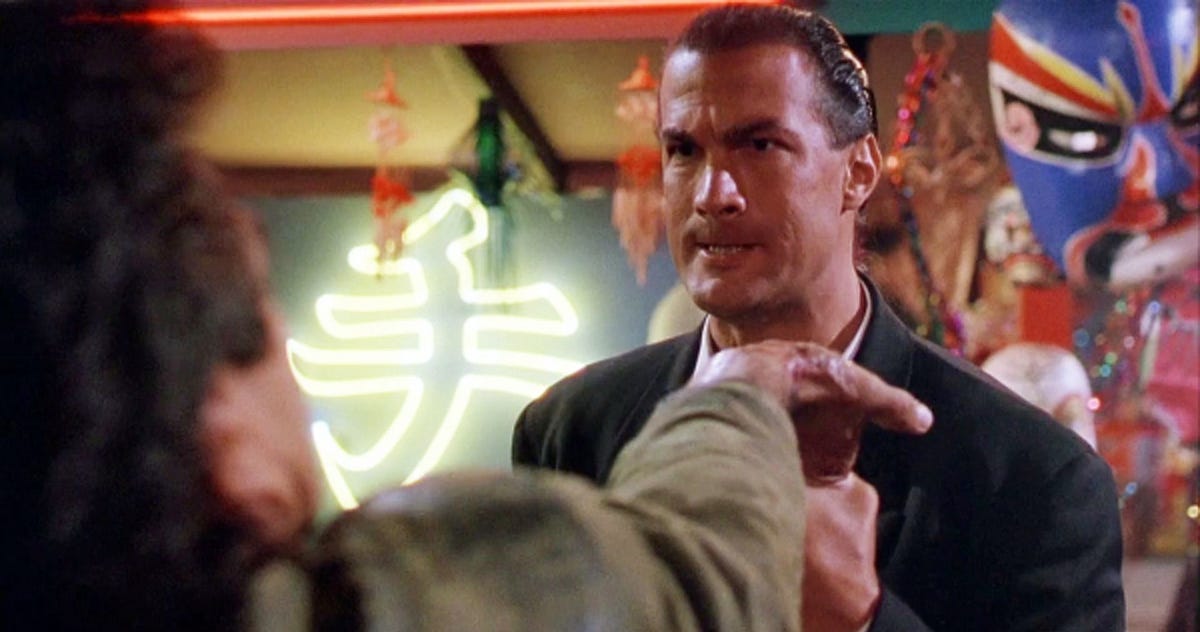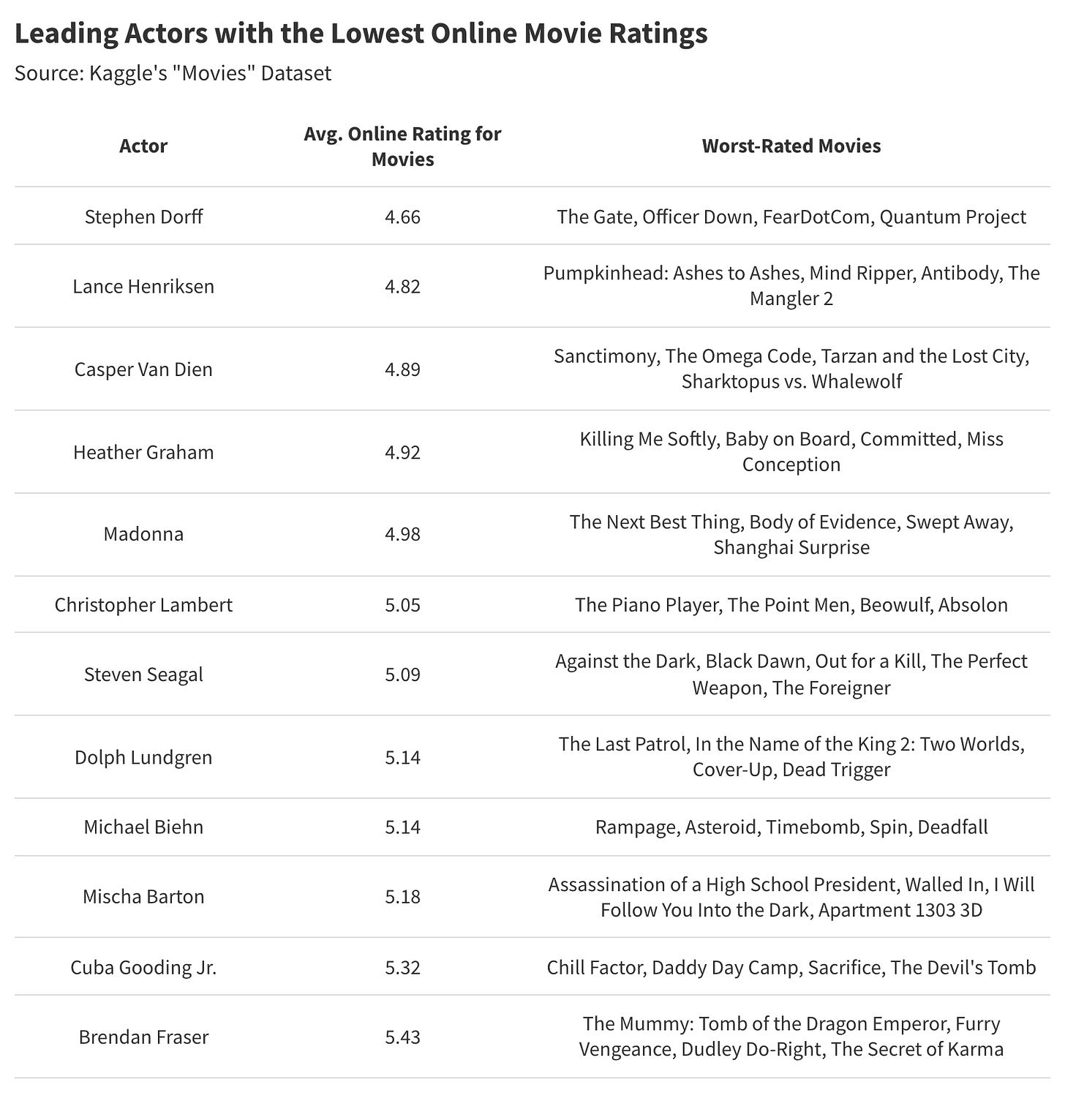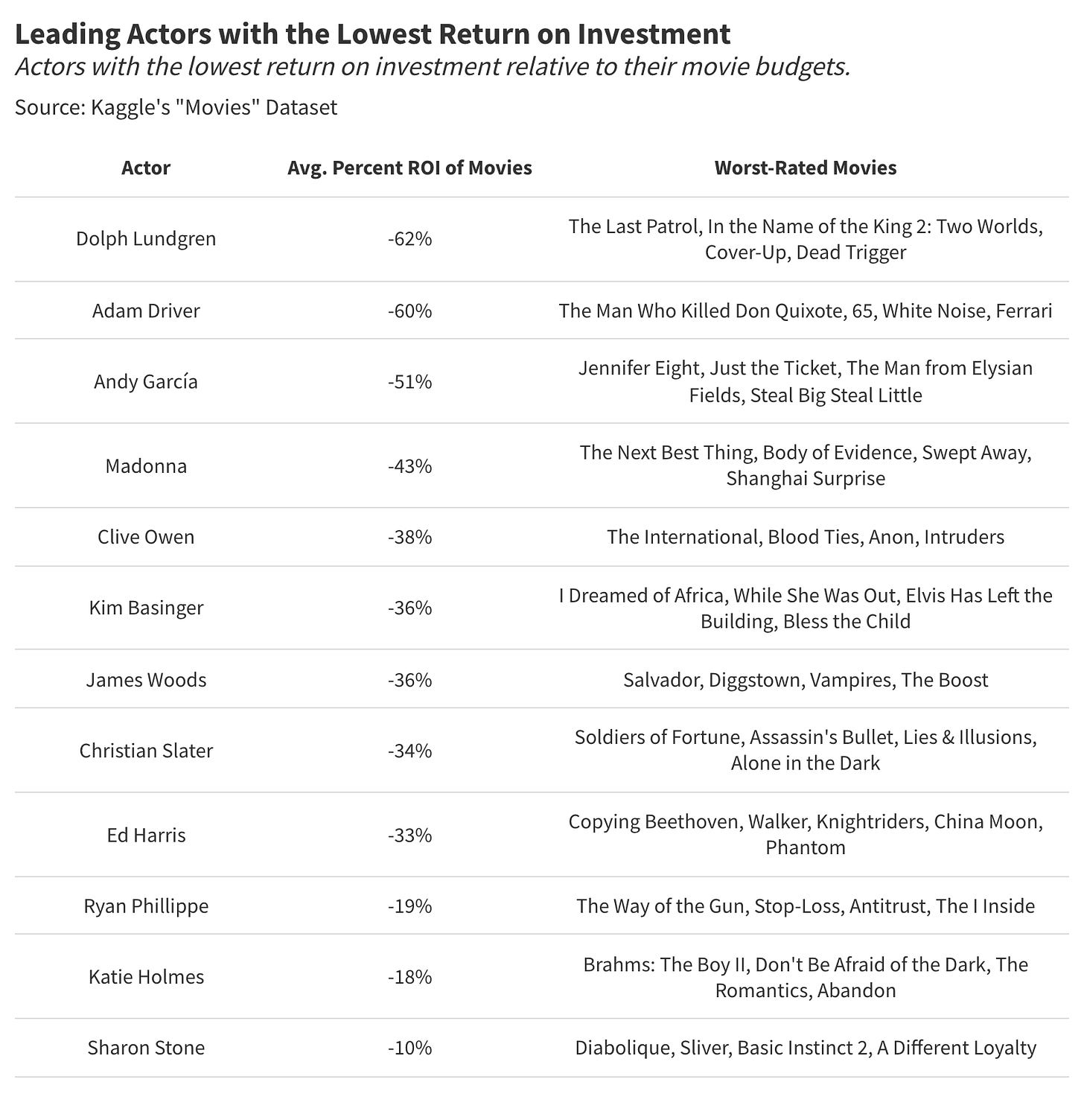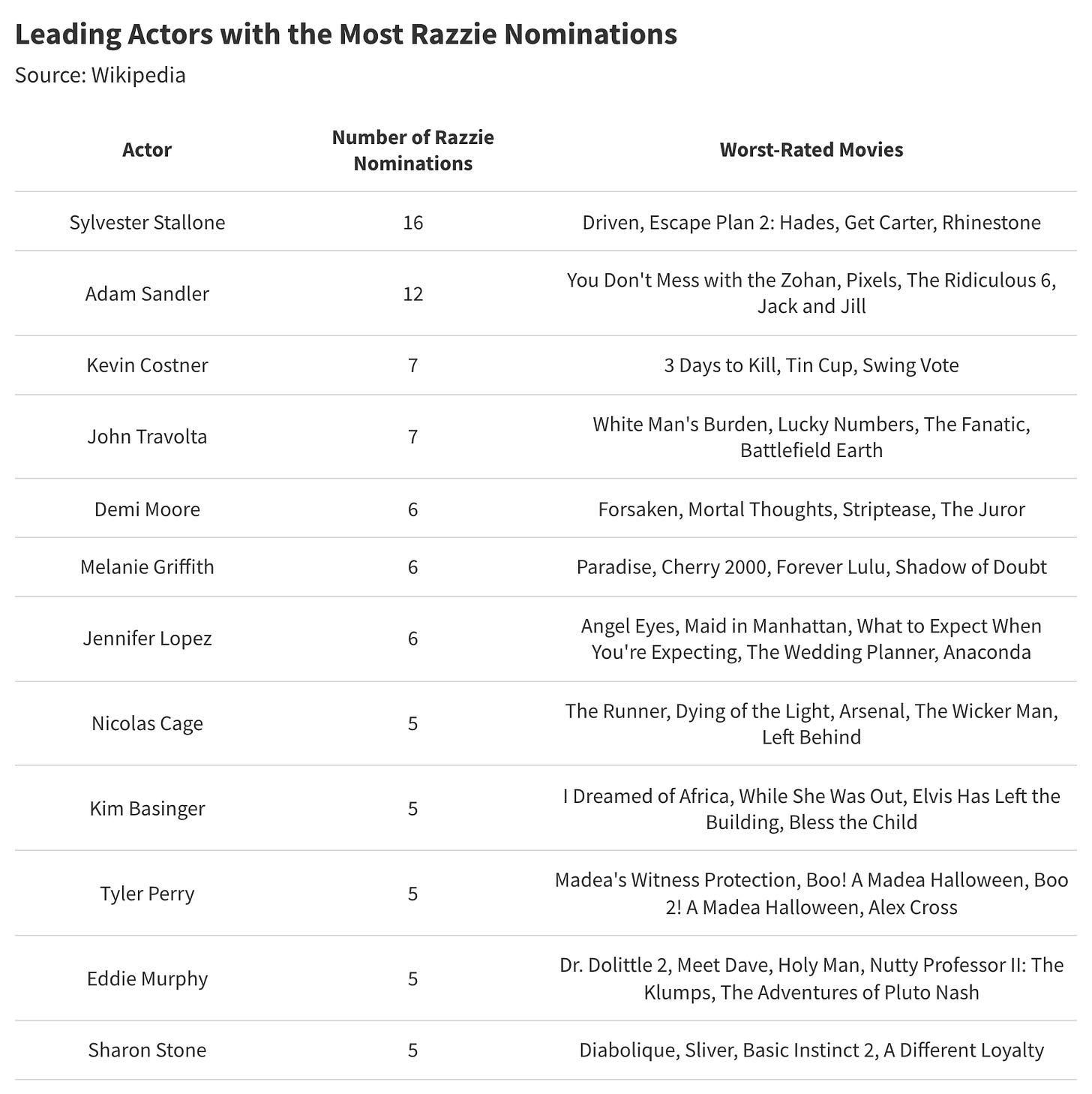- Stat Significant
- Posts
- Who's the Worst Actor in Movie History? A Statistical Analysis
Who's the Worst Actor in Movie History? A Statistical Analysis
Who's the worst actor of all time, and why?

Megan Fox in Jennifer’s Body (2009). Credit: 20th Century Studios.
Intro: What Makes Steven Seagal So Despised?
What does it mean to be well-known for being "the worst"? Consider the ignominious career of Steven Seagal, a much-derided figure and enduring pop culture curiosity. Seagal was one of Hollywood's biggest action stars in the 1980s and early 1990s but has since become a cultural punching bag (akin to Nickelback but with more justifiable animosity).

Steven Seagal in Out for Justice (1991). Credit: Warner Brothers.
Why do internetgoers and critics harbor such disdain for Steven Seagal? Here is a brief assortment of grievances:
Formulaic Movies and Acting:
Bad Acting: His acting is most commonly described as "wooden."
Repetitive Movie Titles: Many of his movie titles sound like the product of a random word generator for vaguely menacing three-word phrases, like On Deadly Ground, Above the Law, Marked for Death, and Out for Justice.
Refusal to Lose an Onscreen Fight: Seagal refused to lose fights in his movies, which limited the stakes of every martial arts battle and the films themselves.
Out-of-control Ego and Bizarre Public Appearances:
Unsubstantiated Claims About National Intelligence Involvement: He often claimed to be arriving on set from CIA operations despite having no known connection to any US intelligence agency.
Wild Quotes: On Genghis Khan, he once said: "I don't know if we have anything in common other than that he was the most brilliant military strategist of his time."
Transgressions Following His Acting Career:
Numerous Claims of Sexual Harassment: Seagal has been accused of sexual harassment by several Hollywood actresses, including Jenny McCarthy and Portia de Rossi.
Relationship with Vladimir Putin: Seagal enjoys a close personal relationship with Vladimir Putin, calling him "one of the greatest world leaders" and receiving honorary Russian citizenship in 2016.
Crypto Scams: He promoted a fraudulent crypto scam called "Bitcoin2Gen," though what celebrity hasn't at this point?
Seagal's unique movie stardom and enduring legacy raise questions about what it means to be a pop culture punchline.
It's one thing to deliver a bad performance in a mediocre film and quietly fade into obscurity, but what happens when someone is universally criticized yet continues to land leading roles? What does it mean to have a successful movie career (by many measures) while simultaneously being labeled a “bad actor”?
So today, we'll identify Hollywood's "worst actors" using various markers of critical and commercial success. We'll investigate trends associated with much-maligned careers and examine what it means to be well-known despite perceived mediocrity and widespread criticism.

Curious how the business of culture is shaping up? Get inspired with TheFutureParty newsletter. They've got insights on entertainment, media, and tech delivered in a 5-minute daily email.
Spot emerging trends, and ride those cultural waves to boost your street smarts and stay relevant.
Criterion #1: Online Movie Ratings
To identify “the worst” movie stars, we must first define what constitutes stardom. For this analysis, we'll define movie stardom as being the top-billed lead (first on the call sheet) in at least five films with an inflation-adjusted budget of $5 million or more.
Our first measure of acting mediocrity concerns online movie ratings—the wisdom of internet crowds. When we average the scores of an actor's leading roles, our list produces some familiar names (like Seagal) and lesser-known actors that require further research.

Some Observations:
Supporting Actors Who Missed in Leading Roles: Actors like Cuba Gooding Jr. and Heather Graham have been highly visible supporting players in acclaimed films—Gooding Jr. even won an Oscar for Best Supporting Actor for his work in Jerry Maguire. Their impressive performances in well-known projects led to starring roles in substandard films like Daddy Day Camp and Sled Dogs. In the aftermath of notable misfires, these actors returned to prominent supporting roles, like in the case of Heather Graham and Lance Henriksen, or flamed out of Hollywood, like Cuba Gooding and Stephen Dorff.
Low-grade 1980s Action Stars: The blockbuster success of Arnold Schwarzenegger and Sylvester Stallone in movies like Commando and Rambo spawned a short-lived yet thriving canon of lone-man vigilante action movies. The leads of these knock-offs, like Dolph Lundgren and Steven Seagal, often possessed caricaturesque physical traits (like being gigantic) or martial arts training. Actors like Jean-Claude Van Damme and Chuck Norris (who were also icons of this subgenre) were well-suited for fight sequences, which made up for lackluster acting ability (at least for a short time).
Criterion #2: Box Office Success
Commercial success isn't a direct reflection of performing ability—a skilled actor could conceivably star in numerous well-reviewed projects of lesser commercial appeal. Yet in an entertainment industry where movie studios invest millions of dollars in search of blockbuster returns, box office is the foremost determinant of actor longevity (when it comes to starring roles).
We'll examine the average percent profitability of an actor's starring performances to evaluate box office success. Profitability, otherwise known as ROI, examines the difference between a movie's production budget and ticket sales. If a movie lost $20M on a budget of $100M, its ROI would be -20%, indicating a 20% loss relative to the budget.
To generate our commercial rankings, we'll calculate the average percentage profitability across an actor's entire portfolio of starring roles.

Some Observations:
Acclaimed Supporting Actors Missing on Big-Budget Projects: Most of the actors on this list are recognizable names known for acclaimed performances, mainly in supporting roles. Ed Harris and Kim Basinger have both won Oscars for Supporting Actor/Actress, while Clive Owen and Sharon Stone have headlined critically acclaimed films. However, quite unfortunately, these actors were also involved in big-time box office bombs when listed atop the call sheet.
Adam Driver: Five years ago, Adam Driver was an ascendant Hollywood star, receiving Oscar nominations in back-to-back years and starring in Disney's Star Wars reboot. Since this time, Driver's role selection could warmly be described as audacious (and/or quite bad), with Driver picking offbeat projects that have questionable scripts. Driver's commercial capital may fall further this Fall (that's a tongue twister), given he leads Francis Ford Coppola's mega-expensive, mega-risky, and potentially catastrophic Megalopolis. It's nice to see Driver taking risks, but not many have paid off.
Need Data Help? Stat Significant Has You Covered!

Enjoying the article thus far and want to chat about data and statistics? Need help with a data or research project? Well, you’re in luck because Stat Significant offers data science consulting services!
If you're looking to turn your data into strategic growth, drop me an email at [email protected], connect with me on LinkedIn, or book a free data consultation at the link below.
Criterion #3: The Razzies
Founded in 1980 by publicist John J.B. Wilson, the Golden Raspberry Awards, or "Razzies," were created as a tongue-in-cheek reaction to the self-congratulatory nature of Hollywood's award season. What began as an informal gathering of film enthusiasts has since evolved into a full-fledged institution with widespread brand notoriety.
The Razzies flip several common Oscar prizes from "Best" to "Worst," with performers receiving "Worst Actor" and "Worst Actress" recognition for dreadful performances in garbage movies. Some widely recognized Razzie winners include Norbit, Space Jam: A New Legacy, Sex and the City 2, The Love Guru, Catwoman, Gigli, and Howard the Duck.
We'll count an actor's career Razzie nominations as evidence of critic disapproval.

Some Observations:
The Biggest Names in Hollywood: Unlike the Oscars, the Razzies aren't televised, which makes marketing an integral part of the awards process. What does this mean in practice? It means the Golden Rasberry Awards tend to favor nominations for widely-known performers so as to generate headlines like "Kevin Costner slammed at the Razzies, wins 'Worst Actor.'" That headline is free marketing for a show that loves clowning big-name celebrities.
Counting Lifetime Nominations Favors Actors with Longer Careers: What does it mean for Adam Sandler to have been nominated for 12 acting Razzies while remaining a fixture of popular culture? There's a version of this criterion that highlights lesser-known actors who receive two nominations in a career with five starring roles. However, that defies the spirit (and intention) of this exercise, which is meant to explore infamy rather than obscurity.
Sylvester Stallone Has 16 Razzie Nominations: Fun fact: this figure only counts Stallone’s acting roles. In total, Stallone has been nominated for 37 Razzies when you factor in directing, screenwriting, and honorary awards. But he also made Rocky, and the Razzies can’t take that away from him.
Final Results: Aggregating Our Criteria
To finalize our list, we'll average the rankings from our three criteria and sort by the resulting aggregate score. So, amidst a long lineage of garbage movies, who stands as the worst actor in human history (and by human history, I mean starting from the Razzie's inception in 1980)?
Apparently, and quite surprisingly, it's someone who isn't widely considered an actor...

Madonna?!?!: Had you given me 100 guesses, I would have never considered Madonna, but this also makes sense. Her film career is much longer and more unfortunate than I'd ever known. Despite numerous flops, her perceived bankability never waned because, well, she was/is Madonna. If you're a movie producer in the late 1980s and Madonna wants to star in one of your movies, you'll take that risk—unfortunately, it's a risk that typically failed.
Steven Seagal!: Whenever I conduct a "greatest of" or "worst of" analysis, I establish a pre-defined methodology and commit to accepting the output of this approach, even if I disagree with aspects of the final rankings. That said, I often stipulate a "go or no-go" condition at the onset of my work, along the lines of "if this movie or person doesn't show up, then I will not publish this piece." For my analysis of the greatest years in movie history, that answer was 1999. I was hoping to see Robert De Niro make the final cut for my essay on the greatest actors of all time. For my worst performer rankings, my proverbial "line in the sand" was Steven Seagal. Apologies to Seagal fans, but any list without this man would be unworthy of the internet. I was ecstatic to see him make the final rankings.
Female Representation: In my analysis of the greatest actors of all time, only one female performer made the top 12 (Audrey Hepburn), while my "worst of" list includes seven actresses—a rather unfortunate contrast. I don't see this as a critique of Hollywood actresses but rather as a reflection of the roles offered to Hollywood actresses (at least, historically speaking). Let's say you're Kim Basinger or Halle Berry, and you've just won an Oscar—an indication that you should be headlining films—what roles are you subsequently offered? Well, in the 1990s and 2000s, it could be garbage like Catwoman or Bless the Child. In the 1980s and 1990s, a mere 20% of leading roles went to female actors, and most of these parts were written by dudes, which is how you get something like Gigli.
Final Thoughts: Why Even Write This?

Madonna in Body of Evidence (1993). Credit: MGM Studios.
In contemplating this essay, I was conflicted about the overwhelmingly negative sentiment underlying its premise. Why categorize other humans as "the worst"? I'm not trying to score points or virtue-signal here because, after all, I ended up publishing my findings. Ultimately, I justified this decision by framing my analysis around one key question: "What makes someone well-known for being subpar, to the point where it dictates their cultural legacy?"
This question is composed of two somewhat paradoxical components:
Being Subpar or "The Worst": these performers have fallen short in some aspect of movie stardom, whether that be performance, project selection, luck, or opportunities given.
Being Well-known: these actors have name recognition as a function of previously acquired career capital. Due to prior accomplishments in the film industry or a completely different profession, they are household names.
There are tens of thousands of actors worldwide, 99.9% of which do not qualify for this analysis, so what distinguishes those who made the cut? What cements Seagal's legend in spite of poor performance (across various facets of life)? Ultimately, the performers featured in our "worst of" rankings possess what the French call je ne sais quoi—an elusive, indefinable quality that sets them apart. This "something else" ensures career longevity despite perceived shortcomings or Razzie recognition.
For Madonna, that "something else" is the fact that she's Madonna (same goes for Jennifer Lopez). For some actors, it's physical prowess or beauty—a uniqueness in how that person's physicality translates to the big screen. For Nicolas Cage, it's his unwavering (sometimes otherworldly) commitment to performance, regardless of script quality. For Stallone and Travolta, their association with beloved classics like Rocky and Saturday Night Fever endows them with eternal relevance.
Ultimately, this "something else" makes a movie star worthy of sustained attention and repeat studio investment. We go to the movies to see things that are distinct, unconventional, or larger-than-life. Unfortunately, sometimes that "thing" is Steven Seagal.
Thanks for reading Stat Significant! Subscribe for free to receive new posts and support my work.
Want to chat about data and statistics? Have an interesting data project? Just want to say hi? Email [email protected]